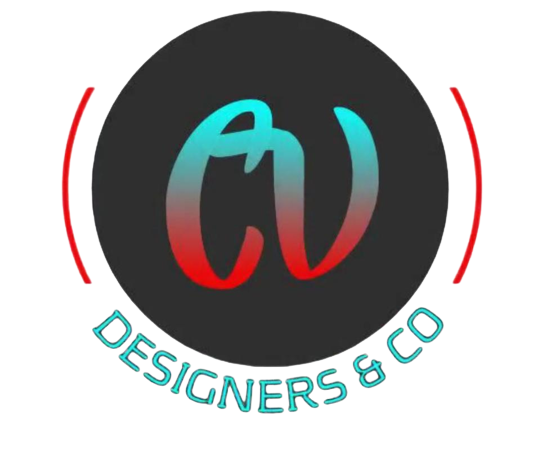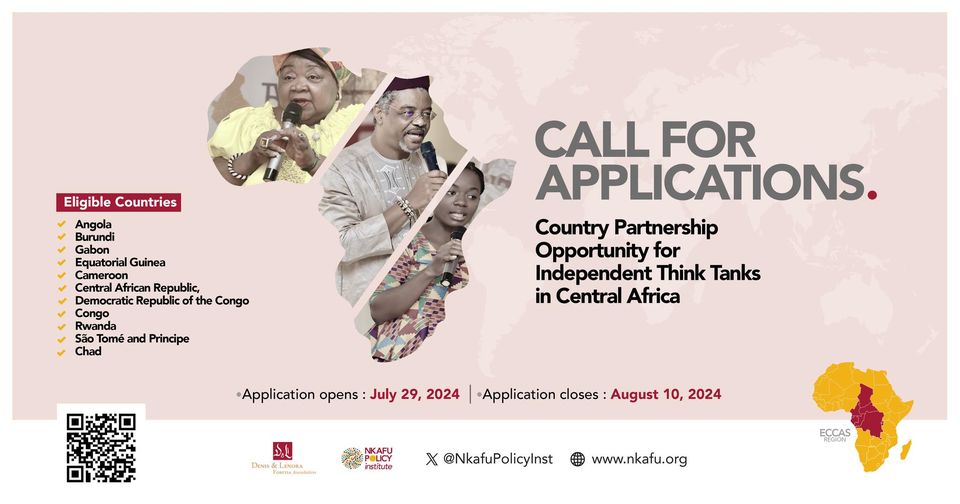Project: Strengthening Central Africa Think Tanks to address Inequality, Informality and promote Inclusive Economic Growth
Issue Date: July 29, 2024
Closing Date: August 10, 2024
Closing Time: 5:00 p.m. Local Cameroonian Time
Eligible countries: Angola, Burundi, Gabon, Equatorial Guinea, Cameroon, Central African Republic, Democratic Republic of the Congo, Congo, Rwanda, São Tomé and Principe, and Chad.
Duration: 6 months
Background
The Economic Community of Central African States (ECCAS) is one of the eight Regional Economic Communities (RECs) created by the African Union. Its main goal is to promote and strengthen harmonious cooperation with dynamic, balanced and autonomous development in all areas of economic and social activity with a view to the gradual establishment of a common market. Today, the ECCAS region accounts for 19% of the population in sub-Saharan Africa (estimated at 223 million), and this proportion could increase by almost 3% to reach 21.5% by 2030 and 22.4% by 2063.
Although population growth has slowed in many Central African countries in recent years, living standards have not improved significantly across the region as a whole, and major efforts are needed to reduce the growing inequality, high levels of informality and to promote inclusive growth. For instance, Rwanda, the Democratic Republic of the Congo (DRC), Burundi, Central African Republic (CAR), and Chad have continuously recorded low human development indices, reflected in low life expectancy, low levels of education, inadequate incomes, and poor quality of life. In other words, the level of human development in these countries remain insufficient to meet the basic needs of their current and future populations, who face enormous difficulties in providing basic services such as access to drinking water, food, and healthcare.
The problem is acute for the youth. According to the United Nations (2022), 51.1% of young workers in Central Africa live in precarious conditions and extreme poverty. Young workers’ exposure to extreme poverty is compounded by the fact that in most ECCAS countries, a job is not a guarantee of decent living conditions or a pathway out of poverty. Female employees are even more vulnerable to poverty or the risk of poverty than their male counterparts, with inequality continuing to rise. According to the World Bank (2021), the percentage of women in vulnerable employment, i.e., unpaid family workers and the self-employed as a percentage of total employment, was estimated at 80.72%, compared with 65.78% for their male counterparts, primarily due to the predominance of the informal sector in the economy.
Reducing poverty in Central Africa requires overcoming persistent gender inequalities, especially within the vast informal sector. To see transformative progress in the ECCAS region in terms of reducing inequality and informality, while ensuring inclusive economic growth and sustainable development in line with the provisions of the SDGs 1 (no poverty), 5 (gender equality), and 8 (decent work and economic growth), there is an urgent need for collaboration among ECCAS think tanks to jointly produce relevant and high-quality research that will have an impact on policy at national, regional, and continental levels.
This is what the Nkafu Policy Institute seeks to do, through our “Strengthening Central Africa Think Tanks to Address Inequality, Informality and Promote Inclusive Economic Growth” project (SCATT/3I project), thanks to financial support from GIZ.
The call is open to think tanks in the Central African region, including Angola, Burundi, Gabon, Equatorial Guinea, Cameroon, Central African Republic, Democratic Republic of the Congo, Congo, Rwanda, São Tomé and Principe, and Chad. This project will support collaborative research among Central Africa Think Tank network partners that address the growing informal sector, persistent inequality and advocate policies that promote inclusive growth in the region.
Objectives
The overall goal of this project therefore is to build collaboration among think tanks in the ECCAS region to jointly produce relevant, high-quality research and provide stakeholders in the Central African region with evidence-informed policy solutions with impact at the national, regional, and continental levels. Specifically, the objectives of the project are to :
- Generating high quality and policy relevant collaborative research, disseminated through knowledge products, tool kits and communication strategies that contribute to the economic transformation, democratic governance, and openness of the Central African region, and
- Enhancing information dissemination, policy outreach, advocacy, and engagement with stakeholders in the Central African sub-region and other continental institutions.
Objectives of the Call
The Nkafu Policy Institute, the project implementer, is working with selected think tanks from the ECCAS region to achieve the project’s expected results. Each selected country will conduct policy research and, participate in multiple events organized within the framework of the project (working sessions, panel discussions, training workshops, seminars, and annual forums). The project directly supports partner think tanks to strengthen their capacity and advocacy reach. The project also allows the improvement of collaboration between think tanks, policymakers (national and international), and civil society actors in the ECCAS region toward the goal of tackling informality, reducing inequality and promoting inclusive growth.
Expectations of Country Partners
This project targets think tanks in Central Africa to ensure thematic research writing through reports and op-eds, participation in key major events and capacity-building workshops. Project activities include:
- Signing of the memorandum of understanding (MOU) and activity agreement
- Undertake collaborative policy research with other think tank partners
- Participate in all activities to be organized as part of the implementation of the project
- Be members of the existing network of a group of think tanks set up to fine-tune the strategy to tackle informality, reduce inequality and promote inclusive growth
- Prepare and submit a Country Project Impact and Evaluation.
- Monitoring of the research activities in its country.
Partnership modalities
The Nkafu Policy Institute will send an official invitation letter to pre-selected think tanks in these countries of the ECCAS region for them to pursue the selection process. However, think tanks that will not receive an official letter by August 5, 2024 but are interested in participating in the project activities, are strongly encouraged to submit a formal request to the Nkafu Policy Institute via the APPLICATION ONLINE PORTAL.
Who can apply?
This call is open only to independent think tanks in Central Africa that are legally registered under the laws of their respective countries.
How to apply?
All applicants should use the Application Portal to submit the following documents:
- A cover letter
- Administrative documents (to indicate legal existence)
- Proof of financial strength and stability (of the last two years or audit reports from the past two years, or both)
- Curriculum vitae of at least three (3) team members demonstrating expertise
- List of current or previous projects successfully executed with referees
- Fill the Assessment tool for think tanks in Central Africa in your preferred language following this link Central Africa Think tank assessment tool
Application Timeline
| Activities | DATE |
| Publication of the call for proposals | July 29, 2024 |
| Application submission deadline, online | August 10, 2024 |
| Notice to selected organizations | August 15, 2024 |
Language
Applications can be submitted in French or English. Expertise in both languages will be of added value.
Evaluation criteria
- A copy of registration/legal documents (proof of appropriate registration g., as a non-profit organization)
- 40%: Financial viability and operational capacity of the applicant
- Financial reports of the last two years or audit reports from the past two years, or both
- Relevant previous projects or activities
- Scale and breadth of operations within the country
- 40%: Technical capacity of the team to implement the proposed project
- Curriculum Vitae of at least three (3) subject matter experts or research personnel
- Relevant publications or achievements
- Applicant’s experience in the research permit application process in the country
- 20%: Applicant’s experience in reducing informality, and inequality and promoting inclusive growth.
For inquiries, please contact the addresses below:
– Dr. Jean Cedric Kouam, Director of Economic Affairs at the Nkafu Policy Institute at jkouam@foretiafoundation.org / Tel: +237 656 25 63 96
with a copy to:
– Mr. Ebenezer Fouefack Fostin (Efouefack@foretiafoundation.org)
– Ms. Sylvia Namondo (snamondo@foretiafoundation.org).

